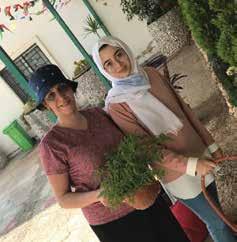
8 minute read
Skills for Success
ENGLISH LANGUAGE
Amideast training centers delivered high- quality English instruction throughout 2020, with only a temporary interruption in services at the outset of the Covid–19 pandemic. Learning continued apace as our offices shifted quickly to offer online instruction at all levels. Highlights of our English language programming for the year included the following.
Advertisement
Developing Foundational Skills of 5,100 underserved youth was made possible through several programs. They included 3,500 enrollees in the U.S. Department of State’s English Access Microscholarship (Access) Program in Egypt, Jordan, Lebanon, Tunisia, and the West Bank/Gaza and in similarly modelled U.S. Embassy-supported programs for youth in Ras Al Khaimah, UAE, and Aden, Yemen. Access-inspired programs also reached hundreds of youth living in Cairo’s Garbage City neighborhood and those in other challenging circumstances, such as IDPs in Mosul,
RAWA, INSPIRE PROGRAM, SYRIAN REFUGEE IN JORDAN
Rawa, a Syrian refugee living near the Jordanian city of Irbid, found a pathway to a brighter future, thanks to the skills she learned and the support she received through the Inspire Program. She discovered that she could contribute to her community through volunteer work, such as planting plants at her school and raising awareness of Covid-19. Moreover, instead of falling behind in her studies, as many refugee youth have, she is happy that "Inspire helped me to develop my skills in speaking and writing the English language fluently, advancing my level at school.”
LULWA BOURISLI,
PCELT TRAINING FOR TRAINERS, KUWAIT
Lulwa Bourisli and Altef Ameshari became the first two Kuwaiti PCELT-licensed trainers, helping Kuwait’s Ministry of Education reach a milestone in its efforts to expand PCELT training for government-school teachers. Said Lulwa, “This course changed my life. It gave me a new outlook on my career and what I can do to help teachers improve their teaching skills.”
—LULWA BOURISLI
Iraq; Syrian refugees and members of the surrounding community in Irbid, Jordan; and refugees in Egypt, the West Bank/Gaza. In addition, adaptations of Amideast’s Skills for Success curriculum offered Kuwaiti and Libyan teens avenues to build English language proficiency and key academic skills as they gained awareness of scholarship and career options.
Tailored Training in English for specific sectors strengthened the communication skills of some 500 Iraqis through the U.S. Embassy-funded English for Mission Contacts program; journalists, pilots, and airline mechanics in Jordan; and tourism and hospitality professionals in the UAE in support of the country’s National Program for Emiratization (Tawteen) and in Jordan through the USAID-funded SCHEP cultural heritage project. Also of note, 90 junior faculty of Al Azhar University in Egypt improved their English language proficiency through a program that has trained 680 since 2013.
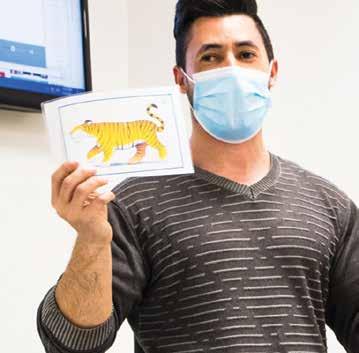
Cultural Programming continued to reach new audiences through our partnership with the U.S. Department of State-funded America House programs in the West Bank and Gaza, six American Corners in Iraqi universities, American Corners in Tunis and Sousse, and a new American Corner being renovated for a 2021 launch in Alexandria, Egypt. In addition, Médiathèque de Khouribga, a cultural center in Khouribga, Morocco, that has operated under Amideast’s management since it opened in 2018, offered a robust menu of activities that attracted more than 27,600 individuals, not including the numbers served in the several months of virtual programming during the pandemic.
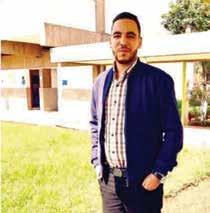
Improving English Language Teaching remained a high priority through our ongoing partnership with World Learning/SIT Graduate Institute to offer the Professional Certificate in English Language Teaching (PCELT), an internationally recognized certificate course for the professional development of the region’s English language teachers. While the Covid-19 crisis forced the cancellation of many of the summer programs that teachers would normally attend, we were pleased that donor support enabled us to offer PCELT training to 69 teachers in Kuwait and the West Bank/ Gaza, bringing to 935 the number of teachers in 10 countries who had earned PCELT certification by year’s end. The successful introduction of cutting-edge technology such as a Swivl Robot in Kuwait not only made PCELT possible during the pandemic, but also represented Amideast’s adaptability and growing capacity to provide creative virtual training solutions.
WORKFORCE SKILLS
Amideast delivered training in skills required by the region’s workforce for success in today’s challenging economic environment. More than 3,000 men and women benefited from courses, workshops, and seminars in areas such as global communications, technology applications, interpersonal skills, entrepreneurship, and performance-based management practices.
ABDELMOULA TAIB,
EMPLOI FBR, MOROCCO
Like many unemployed Moroccan youth, Abdelmoula faced an uncertain future. But the soft skills that he learned through the Emploi FBR program led to his hiring as a school teacher. “This training helped me present myself to others—to make them believe in me,” he says, adding that he now dreams of teaching at a university one day.
—ABDELMOULA TAIB
ONLINE PROGRAMMING EARNS ACCLAIM
Amideast-managed learning centers in Dakhla and Laayoune received national recognition for the online training programming that they launched in late March in the face of stay-at-home measures adopted by the Moroccan government. Named one of the top 10 online responses to the Covid-19 pandemic in Morocco by local press, “L’Formation MenDarek” training program ensured that nearly 400 young people were able to continue to develop their employability and entrepreneurship skills and engage in virtual social and cultural events. In addition, Médiathèque de Khouribga, a multi-media center of innovation and culture managed by Amideast on behalf of OCP Foundation, remained active online after closing its doors to onsite activities. By using its YouTube channel and livestreaming applications, it continued to offer weekly workshops for children and young people including master classes in Arabic calligraphy, language lessons, visual arts and art projects, and creative writing.
Employability With funding from the Al Khatib Foundation, Asfari Foundation, Boeing Company, Citi Foundation, U.S. Millennium Challenge Corporation, and U.S. Department of State, Amideast delivered training that helped more than 600 individuals improve their chances of finding employment and progressing on a rewarding career path despite the challenges posed by the region’s highly competitive job market. Programs based on our impactful Skills for Success® model met the needs of youth in Egypt, Lebanon, Morocco, Saudi Arabia, and the UAE. In addition, in Kuwait, two separate rounds of Women Empowerment through Career Development were delivered with funding from the Boeing Company and the U.S. Embassy in Kuwait, providing a total of 80 women with tools that will enable them to improve their professional skills and increase their future career goals and prospects. The year also saw the launch of two exciting, innovative programs in Jordan, one offered in partnership with Inventionland to support aspiring youth inventors in locations throughout the country, and the other, with funding from the Boeing Company, to provide training and development in data science to fresh university graduates in computer science, engineering, and information and communication technology (ICT).
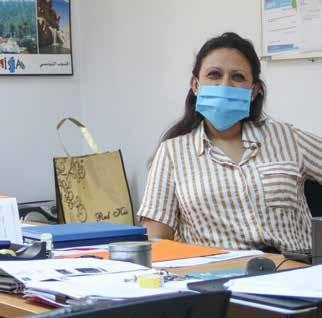
Meanwhile in Morocco, two skills centers, developed and managed with Amideast’s support since 2014, continued to achieve impact in the communities they serve by helping local youth to find meaningful employment, promoting entrepreneurship, and strengthening the capacities of local nonprofit organizations. In 2020, the Dakhla and Laayoune learning centers, sponsored by Phosboucraa Foundation, benefited nearly 1,800 youth through employability and entrepreneurship training, career counseling, and jobsearch coaching, and they engaged over 30,000 additional participants through cultural and webinar activities.
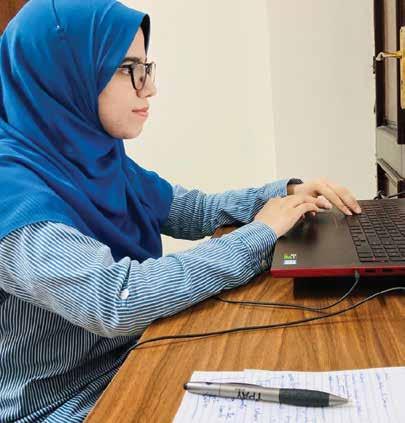
Entrepreneurship The Amideast Entrepreneur Institute (AEI) in Beirut advanced the goals of 28 current and aspiring entrepreneurs enrolled in customized online Start Your Own Business workshops and benefited others through its free legal clinic for entrepreneurs, Growthwheel®, and 25 weekly episodes of its newly established online series Amideast Connects. In addition, Amideast/Lebanon made it possible for Lebanese, Palestinian, and Syrian youth who want to launch a business as a path to a brighter future to choose an entrepreneurship track in the Skills for Success programs that it offered.
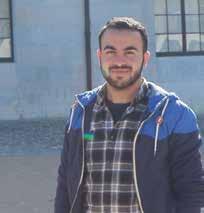
In other bright spots, 16 teams of young Egyptian entrepreneurs improved their management of new businesses through the Citi Foundation-funded Skills for Success: Employability and Entrepreneurship Program that was launched in 2019; and our West Bank/Gaza office partnered with the American Spaces program to offer virtual training in civic entrepreneurship and tools that Palestinian youth would need to embark on an entrepreneurship path.
HESHAM NASSAR, YOUTH
ENTREPRENEURSHIP PROGRAM 2, EGYPT
“YEP 2 was an intellectual turning point for me,” recalls Hesham Nassar. When he joined the Citi Foundation-funded Youth Entrepreneurship Program (YEP) in 2019, he had a prototype in mind of a business that uses ozone to address his country’s waste disposal challenge by sterilizing and recycling. With YEP’s support, he launched his startup, “Ozo Solu,” and completed the formal registration process, began production of three products, and grew his team from two to six. “YEP allowed me to focus equally on the technical and interpersonal aspects—on how to combine technical and personal skills. If they meet in one person, this person is able to succeed and leave a mark in any business,” he says.






